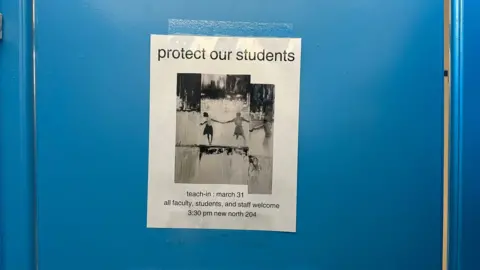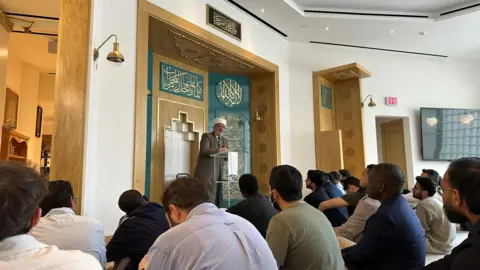Anxiety at US colleges as foreign students are detained and visas revoked

For the last few weeks, many foreign students living in the US have watched as a sequence of events has repeated itself on their social media feeds: plain-clothes agents appearing unannounced and hauling students off in unmarked cars to detention centres.
Those taken into custody in a string of high-profile student detentions captured on video have not faced any criminal charges and instead appear to have been targeted for involvement in pro-Palestinian protests on college campuses.
The Trump administration has said repeatedly that visas are a "privilege" and can be revoked at any time for a wide variety of reasons.
But the crackdown appears to be far wider than initially thought, with more than 1,000 international students or recent graduates at colleges across the US now having had their visas revoked or legal statuses changed, according to a tracker from Inside Higher Ed, an online news site covering the sector.
For many, the precise reasons are unknown, and universities have often only learned of the changes when checking a government-run database that logs the visa status of international students.
The combination of targeted detentions and reports of wide-scale visa revocations have left campuses on edge, from the biggest public universities to elite Ivy League institutions, students and faculty told the BBC.
"I could be next," said one student visa-holder attending Georgetown University, who has written articles about Israel and the war in Gaza.
He's begun carrying around a card in his pocket that lists his constitutional rights, in case he is ever stopped by law enforcement.
Another student in Texas said he's afraid to leave his apartment, even to buy groceries.
And at some colleges, departments are being hit as researchers abroad refuse to return to the US.
Most students the BBC spoke to requested anonymity out of fear that having their names in the media could make them a target.
The BBC has contacted the Department of Education for comment.

The reasons for visa cancellations vary. In some cases, criminal records appear to be a factor. Other instances have reportedly included minor legal infractions like driving over the speed limit. But "a lot" of those targeted have been involved in pro-Palestinian protests, Secretary of State Marco Rubio himself has said.
It is part of a wider White House push to crack down on protesters whom officials say created an unsafe environment for Jewish students on many campuses. They also accuse demonstrators of having expressed support for Hamas, an officially designated terrorist group.
"Every time I find one of these lunatics, I take away their visas," Rubio told reporters in late March. "We do it every day."
Civil liberties groups have protested the detentions and moves to deport student demonstrators as a violation of constitutional rights. And the students themselves reject associations with Hamas, saying that they are being targeted for political speech about the war in Gaza and US support for Israel.
At Georgetown, signs that read "protect our students" have been taped to the doors of bathroom stalls, adding a sense of gloom to the cherry blossom trees and tulips that typically mark the arrival of spring on campus.
A postdoctoral fellow from the university, Badar Khan Suri, was grabbed by federal agents outside his Virginia home in March. The Department of Homeland Security accused the conflict resolution researcher of "promoting antisemitism on social media" and having links to a "known or suspected terrorist".
This was an apparent reference to the Palestinian father of his US-born wife, a former adviser to killed Hamas leader Ismail Haniyeh.
Mr Suri's lawyers say he has only met his father-in-law a handful of times and is being targeted due to his wife's identity.
His detention followed that of Columbia University student protest organiser Mahmoud Khalil, a permanent resident arrested at home in New York but now awaiting deportation from a facility in Louisiana.
Tufts University graduate student Rumeysa Ozturk, who co-authored a student newspaper op-ed about Gaza and was detained in Massachusetts, is also being held in Louisiana.
Last Monday, Mohsen Mahdawi, another Columbia student protester, was detained in Vermont as he attended an interview to obtain US citizenship. Like Mr Khalil, he holds a green card, rather than a student visa.
"Based on the detentions that we're seeing, I think there is a possibility anyone who has been outspoken about Palestine can be detained," said the Georgetown student, who knew Mr Suri.
The White House says it is going after those who have been involved in activities that "run counter" to US national interests. In Mr Khalil's case, officials have cited a 1952 law that empowers the government to order someone deported if their presence in the country could pose unfavourable consequences for US foreign policy.
In a post on X, the Columbia Jewish Alumni Association celebrated Mr Khalil's arrest, calling him the "ringleader of chaos" at the university.
Polling suggests that immigration is an issue where President Trump enjoys some of his highest approval ratings, with recent Reuters and AP-NORC surveys suggesting about half of US adults approve of action in that area, several points higher than his overall rating.
Universities are also being targeted at an institutional level. This week, the White House's task force on combating antisemitism froze over $2bn in funding for Harvard University, after the university refused to agree to a list of demands that it said would amount to "surrendering its independence".
Trump officials have said that if Harvard doesn't comply with a request for information on certain student visaholders, it will stop granting visas to international students who want to study there.
Georgetown professor Nader Hashemi said he believes the government's main goal is "silencing dissent" by intimidating would-be protesters.
The Georgetown student says he has asked his parents not to fly from India to the US to see him graduate with a master's degree in just a few weeks. He is still unsure if he will even attend the ceremony.

In addition to checking his email daily to see if he is among the hundreds that have had their visas revoked recently, he has also prepared for the possibility of sudden arrest.
"I have cleared my chats across messaging apps, and I have learned how to quickly lock my phone in SOS mode," he said.
Georgetown professors have even begun offering spare rooms to students who worry about being visited by immigration agents at their residences, said Prof Hashemi.
"This is part of the trauma that I think students are facing," he said.
At Tufts University, outside of Boston, Massachusetts, students are waiting to see what happens to Ms Ozturk, who was detained outside her home.
Video shows her confused and shaking in fear as she is intercepted by agents while headed to a Ramadan dinner celebration. Last year, she had co-authored an op-ed supporting the boycott, divest and sanction (BDS) movement against Israel.
Tufts PhD student Anteri Mejr told the BBC that the actions have had a "chilling effect", and that international students she knows who have left the country to visit home or attend conferences are now afraid to return.
"There are students working remotely because they're afraid they can't get back in the country," he said.
At the University of Texas, rumours about Immigration and Customs Enforcement (ICE) raids on campus have some students terrified.
"I'm scared to be out. I'm scared to come to school. I'm scared to go grocery shopping," a master's student there said.
"I'm afraid that if I'm walking, I will be approached by agents in incognito clothes and plain disguise," he continued.
Despite being a green card holder and having not played a role in pro-Palestinian protests on campus, he says he is still in "crippling anxiety" because he has written things that are critical of the president.
"How far does this administration dig through, like, an immigrant's history?" he asked. "What if I did say something and I'm not aware."
BBC



